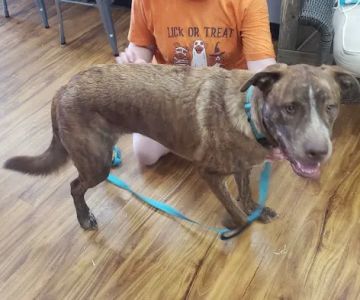How to Stop Your Dog from Jumping on Guests
One of the most common behavioral issues that dog owners face is their dogs jumping on guests. While it may be cute when your dog is a puppy, it can quickly become frustrating, especially when they jump on people during visits or gatherings. If you're wondering how to stop your dog from jumping on guests, you're not alone. Many dog owners face this issue, and fortunately, with a little patience and training, it's entirely possible to correct this behavior.
1. Understanding Why Dogs Jump
Before diving into solutions, it's important to understand why dogs jump on people in the first place. Dogs usually jump to greet others, especially when they're excited or seeking attention. In some cases, dogs may also jump to show dominance or out of anxiety when meeting new people. By understanding the motivation behind the jumping behavior, you can address it more effectively.
For some dogs, jumping is simply a learned behavior from when they were puppies and it wasn't discouraged. Puppies are naturally inclined to jump up to interact with their owners, and if not corrected early on, this behavior can continue into adulthood.
2. Set Clear Boundaries with Consistent Training
The most effective way to stop your dog from jumping on guests is by setting clear boundaries and being consistent in your training efforts. Dogs thrive on consistency, so it's important that everyone in the household reinforces the same rules regarding jumping.
When your dog jumps on a guest, immediately stop any interaction. Turn your back and ignore your dog. Do not give them attention, even if it's negative attention, like scolding them. The key here is to make it clear that jumping results in the withdrawal of attention, which is what your dog craves the most.
Once your dog calms down, you can give them attention, but only if they are sitting or standing politely. This reinforces the idea that calm behavior leads to positive interactions.
3. Training Techniques to Use
There are several training techniques that can help you stop your dog from jumping. The key is to practice these techniques regularly, not just when guests arrive. Here's a step-by-step guide to some effective training methods:
3.1. The Sit Command
Teaching your dog the "sit" command is one of the most effective ways to stop them from jumping on guests. When your dog starts to jump, immediately ask them to sit. If they comply, reward them with a treat or praise. Consistent repetition of this will help your dog associate sitting calmly with receiving attention.
3.2. The “No Jumping” Command
Another effective way to curb jumping is to teach the "no jumping" command. When your dog jumps, calmly say “no jumping” in a firm but not angry tone. If your dog stops, reward them. If they continue to jump, turn away and stop interacting until they settle down. This will teach them that jumping doesn’t get them what they want.
3.3. Positive Reinforcement
Positive reinforcement is crucial in training. Every time your dog behaves appropriately, such as sitting calmly when guests arrive, reward them with treats or praise. Over time, they will start to associate good behavior with rewards, which will help reduce jumping behavior.
4. Teaching Your Dog to Greet Guests Calmly
It's important to teach your dog how to greet guests calmly. Begin by practicing the behavior before guests arrive. You can ask your dog to sit and stay when you open the door. Practice this routine with family members or friends before doing it with new guests.
If your dog remains seated and calm when guests enter, reward them with treats and praise. If they jump, have the guest remain calm and not interact with the dog until they stop jumping. Gradually, your dog will learn that guests will only engage with them when they remain calm.
5. Manage Your Dog’s Excitement Level
One reason dogs jump on guests is because of excitement. If your dog is overly excited when people arrive, it can be harder for them to control their impulses. To manage this excitement, try to tire your dog out before guests arrive. Take them for a walk or play a game of fetch to burn off some energy.
Another approach is to create a calming environment before guests arrive. You can use calming sprays, pheromone diffusers, or calming music to help reduce anxiety and prevent excessive excitement. The less excited your dog is, the less likely they are to jump on people.
6. Seek Professional Help if Necessary
If your dog’s jumping behavior is persistent or difficult to manage, it might be time to seek professional help. Professional dog trainers have the experience and knowledge to address challenging behavioral issues. They can assess your dog’s behavior, provide you with personalized training plans, and guide you through the process of correcting unwanted behaviors.
If you’re unsure where to find a qualified trainer, you can always ask for recommendations from your veterinarian or check with your local pet stores. Some trainers offer private sessions, while others conduct group classes, so you can choose the option that works best for you and your dog.
7. Conclusion: Building a Strong Bond with Your Dog
Stopping your dog from jumping on guests is possible with patience, consistency, and positive reinforcement. Remember, training your dog is a process that takes time, and it's important to stay committed to the task. As you work through the training process, you will not only reduce the jumping behavior but also strengthen your bond with your dog. A well-behaved dog makes for a happier household and a more enjoyable experience for guests.
If you’re looking for additional advice or resources, be sure to check out Hidden Brook Veterinary for expert services and recommendations that will help you raise a well-behaved and happy dog.











